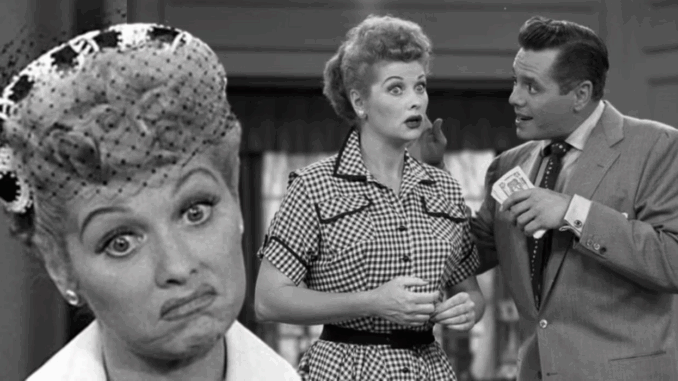
From Comedienne to Mogul: How Lucille Ball Built a Media Empire and Her Astounding Net Worth
For generations, Lucille Ball has been celebrated as the queen of comedy, a trailblazing performer who redefined the sitcom genre with her unparalleled comedic timing and infectious charm. As the star of “I Love Lucy,” she brought laughter into millions of homes, creating a character so beloved she remains an icon to this day. But while her comedic genius is well-documented, her business acumen is a story that, while often told, is rarely given the full credit it deserves. Lucille Ball was not just a successful actress; she was a pioneering media mogul, and her financial legacy at the time of her death in 1989 was a testament to her foresight and business prowess.
The question of how much Lucille Ball was worth at the time of her death is not simply a matter of salary, but a deep dive into how she and her then-husband, Desi Arnaz, leveraged their fame to build an entertainment empire that would forever change Hollywood. While exact figures are always difficult to pinpoint, estimates of her net worth at the time of her passing range from a staggering $60 million to over $100 million. To put that into perspective, $100 million in 1989 would be worth well over $250 million in today’s economy, a fortune that solidifies her as one of the most successful entertainers and entrepreneurs of her time.
The Revolutionary Deal: Owning the Show’s Rights
The foundation of Lucille Ball’s wealth was laid in the early days of “I Love Lucy.” When CBS approached her to create a television show based on her popular radio program, they wanted to film it live in New York, a standard practice at the time. Lucille and Desi, however, had a different vision. They insisted on moving the production to Hollywood, using a new three-camera film technique, and, most importantly, they secured a deal that was unheard of in the industry: they would retain ownership of the show’s syndication rights.
At a time when networks owned and controlled their shows, this was a revolutionary move. It meant that every time an episode of “I Love Lucy” was sold to be re-run, the money would flow not to CBS, but to their company, Desilu Productions. This decision, driven by Desi’s business savvy and Lucille’s unwavering support, created a perpetual revenue stream that would generate millions of dollars for decades. The show’s enduring popularity ensured that the money never stopped flowing, making the reruns themselves a more valuable asset than the original broadcasts.
The Business Empire: Desilu Productions
While “I Love Lucy” was the engine, Desilu Productions was the vehicle that drove their success. Under Desi’s brilliant management, the company became a media powerhouse, responsible for more than just their own shows. They became a production giant, greenlighting and producing some of the most iconic series in television history.
The company’s most pivotal turning point came after Lucille and Desi’s divorce in 1960. In 1962, Lucille made the bold decision to buy out her ex-husband’s share of the company for a reported $3 million. With that single transaction, she became the sole owner of Desilu and the first woman to run a major Hollywood production studio. Her role transitioned from actress to full-fledged mogul, a move that showcased her incredible courage and business acumen.
As the head of Desilu, she oversaw the production of television shows, but two, in particular, would cement her legacy as a business visionary: “Star Trek” and “Mission: Impossible.” Both shows were considered risky ventures at the time, but Lucille Ball’s unwavering support and decisive leadership were crucial in getting them made. They went on to become global phenomena, generating billions of dollars in revenue for Desilu.
The Post-Desilu Years and the Final Tally
In 1967, recognizing the shifting landscape of Hollywood and the value of her assets, Lucille Ball made another shrewd financial move. She sold Desilu Productions to Gulf+Western for a sum of approximately $17 million. This sale, a massive amount in the late 1960s, was a key contributor to her personal wealth. Her share of the company was a significant percentage of this total, securing her financial future for life.
Even after selling her company, Lucille Ball continued to work, appearing in numerous TV specials and films. She formed her own production company, Lucille Ball Productions, and continued to have a presence in the entertainment industry. She also invested wisely in real estate and other ventures, ensuring her fortune continued to grow.
By the time of her death in 1989, Lucille Ball was a quiet but exceptionally wealthy woman. Her net worth, estimated to be between $60 million and $100 million, wasn’t just a testament to her acting. It was the result of a brilliant and courageous business strategy that spanned decades. She leveraged her popularity not to just earn a salary, but to own her work, control her destiny, and build an empire that would outlive her. Her legacy is one of power, creativity, and incredible foresight. She proved that a woman could be a brilliant entertainer and an even more brilliant businesswoman, forever changing the landscape of Hollywood and leaving a fortune that truly matched her iconic status.